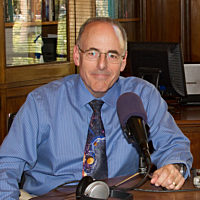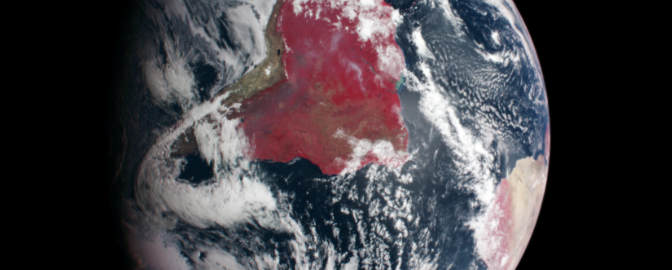The 2025 Cosmos Award winner: Dava Sobel

Written by
Mat Kaplan
Senior Communications Adviser and former Host of Planetary Radio, The Planetary Society
June 19, 2025
“Writing is perhaps the greatest of human inventions, binding together people who never knew each other, citizens of distant epochs. Books break the shackles of time. A book is proof that humans are capable of working magic." — Carl Sagan in “Cosmos: A Personal Voyage”
Nearly thirty years after his passing, Planetary Society co-founder Carl Sagan is still regarded by many as the finest science communicator of modern times. His 1980 public television series, “Cosmos: A Personal Voyage,” remains one of the most popular and beloved programs of all time.
The Planetary Society established the Cosmos Award for Outstanding Public Presentation of Science in 2005. Only six individuals have received it. They include James Cameron, Neil deGrasse Tyson, Alan Stern, Paula Apsel, and Stephen Hawking. This year, we were proud to add acclaimed author Dava Sobel to that distinguished list — a storyteller who embodies the spirit of science communication with grace, clarity, and curiosity.

You’d be forgiven for thinking that it was her lovely 2005 book “The Planets” that put Dava in consideration for the Cosmos Award. The highly personal and evocative collection of essays about the worlds of our Solar System played a role in the decision, but only as additional evidence of her ability to bring science alive on the page.
The Planetary Society’s board of directors recognized that Dava’s writing stands as testament to the power of storytelling in science. She shows us that the Universe is explained not just through equations and experiments but through human stories, making distant historical figures breathe again, and allowing us to see science through their eyes and feel their wonder. These gifts made her an ideal recipient of the Cosmos Award.
Dava joined us in Washington, D.C., on the evening of May 30 to be celebrated by Bill Nye, our board of directors, and special guests. In her quietly eloquent acceptance speech, Dava shared how very honored she was to receive this award named for one of the greatest achievements of Carl Sagan, the person she credits with having set her on her course so many years ago.
Dava first met Carl Sagan when she interviewed him at Cornell University for an article in a local paper. He wrote her a letter of recommendation that helped her get a writing job at the institution. Later, as production of “Cosmos” was getting underway, Carl would again recommend Dava as a great choice for the public information agent who would be present as shooting proceeded around the world.
Bronx-born Dava was herself soon recognized across our pale blue dot as a gifted writer. She won the British Book of the Year award for “Longitude: The True Story of a Lone Genius Who Solved the Greatest Scientific Problem of His Time.” In 1999, she penned “Galileo's Daughter: A Historical Memoir of Science, Faith, and Love.” It would become a finalist for the Pulitzer Prize.
Our paths began to cross in the fall of 2023. Dava offered to adapt “Galileo’s Daughter” for a very special stage presentation. Under the direction of Planetary Society board member Robert Picardo, celebrated actors John Rhys-Davies and Linda Purl became Galileo and his brilliant, convent-sequestered daughter, Sister Maria Celeste. They recited a portion of the long thread of letters that had inspired Dava to create the book.
That enchanted event gave me my first opportunity to talk with Dava. She would return for more Planetary Radio interviews over the following years. Every conversation was as magical, captivating, and entertaining as her books.
Dava's latest book is “The Elements of Marie Curie: How the Glow of Radium Lit a Path for Women in Science.” It provides even more proof of her marvelous writing talent and her ability to reveal fascinating aspects of both the famous and the obscure. She also reveals the great and ongoing human drama known as science, that it is not merely a collection of discoveries but a deeply human enterprise — one filled with passion, struggle, wonder, and perseverance.
Several of Dava’s works have demonstrated that science and wonder have never been the exclusive provinces of men, though demonstrating this truth can still be a struggle. Marie Curie faced and largely overcame profound challenges, elevating scores of brilliant, dedicated women of science as she did. The pioneering female astronomers whose work Dava chronicled in “The Glass Universe” remain largely unknown, yet their contributions underlie many of the most profound discoveries of the 20th century, including the existence of other galaxies and the expanding Universe. Dava has shown us how uplifting and rewarding this struggle can be, even in the face of opposition and disparagement.
We congratulate Dava Sobel and thank her for carrying us along on this voyage that is advancing our own vision: to know the Cosmos and our place within it.
Major works by Dava Sobel
1995 – “Longitude: The True Story of a Lone Genius Who Solved the Greatest Scientific Problem of His Time”
2000 – “Galileo's Daughter: A Historical Memoir of Science, Faith, and Love”
2005 – “The Planets: A discourse on the discovery, science, history and mythology, of the planets in our solar system, with one chapter devoted to each of the celestial spheres”
2011 – “A More Perfect Heaven: How Copernicus Revolutionized the Cosmos”
2014 – “And the Sun Stood Still: A Play”
2024 – “The Elements of Marie Curie: How the Glow of Radium Lit a Path for Women in Science”
Support our core enterprises
Your gift today will go far to help us close out the year strong and keep up our momentum in 2026.
Donate

 Explore Worlds
Explore Worlds Find Life
Find Life Defend Earth
Defend Earth

